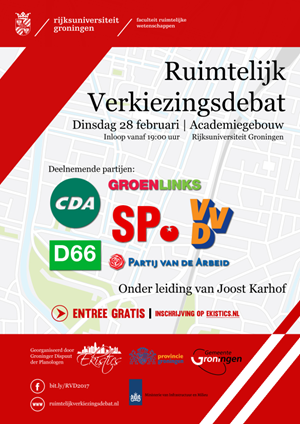Aspirant-Kamerleden debatteren over ruimtelijke ordening

Op dinsdag 28 februari 2017 vond voor de derde keer het Ruimtelijk Verkiezingsdebat plaats, georganiseerd door het Groninger Dispuut der Planologen Ekistics en ondersteund door de Faculteit Ruimtelijke Wetenschappen. Tijdens het debat in het Academiegebouw gingen kandidaat- Kamerleden van CDA, D66, GroenLinks, SP, PvdA en VVD met elkaar in debat over ruimtelijke thema’s.
Het debat werd geopend door Joost Karhof, journalist en debatleider van de avond. In zijn inleiding noemde Karhof dat het debat niet alleen over regionale, maar ook over nationale kwesties van ruimtelijke ordering zou gaan. Hierna werd het woord gegeven aan Ward Rauws, docent Planologie aan de RUG. ‘Als planoloog maakt mijn hart een sprongetje’, zei Rauws bij het zien van de ongeveer 250 aanwezigen. Bij het uittesten van de stemkastjes die iedereen op zijn/haar stoel kon vinden bleek dat een ruime meerderheid van de aanwezigen bestond uit studenten van de Faculteit Ruimtelijke Wetenschappen. Maar ook studenten van andere faculteiten, medewerkers van de Provincie Groningen en medewerkers van de RUG waren goed vertegenwoordigd.
Kwaliteit van leven
Rauws benadrukte dat het belangrijk is om aandacht te besteden aan ruimtelijke thema’s, omdat de levensomgeving van mensen grote invloed heeft op welzijn en de kwaliteit van leven. Daarom moeten we de leefomgeving toekomstgericht inrichten, stelde Rauws. De ruimtelijke thema’s die in het debat besproken werden centreerden zich om duurzame energie, de kracht van de regio, mobiliteit en klimaat.
Betekenis van het Nederlandse landschap
Nadat alle kandidaat-Kamerleden zich hadden voorgesteld, werd er gedebatteerd aan de hand van stellingen. Een van deze stellingen luidde: ‘Het Nederlandse landschap is van oudsher een energielandschap en mag daarom per definitie gebruikt worden voor energieproductie.’ Hoewel het debat ook gericht was op nationale kwesties was er veel aandacht voor de gaswinning in Groningen tijdens het debat over deze stelling. Sandra Beckerman (SP) zei dat het in Groningen ‘pijnlijk duidelijk is hoe het niét moet’. Stientje van Veldhoven (D66) stelde dat er in het geval van de Groningse gaswinning ‘over mensen heen is gewalst’. De meerderheid van de kandidaat-Kamerleden noemde het belang van het vroegtijdig betrekken van gemeentes en bewoners bij plannen die invloed hebben op de leefbaarheid in een bepaald gebied.
Mobiliteit
Ook bij het thema ‘mobiliteit’ werd er aandacht geschonken aan problemen en kansen in de provincie Groningen. De stelling ‘Uitbreiding van het wegennet moet geflankeerd worden met minimaal dezelfde investering in alternatieve mobiliteit’ werd ingeleid met een video waarin een woordvoerder van Groningen Bereikbaar sprak over de aanpak van de zuidelijke ringweg. Tijdens het debat werd er veel gesproken over de frictie tussen twee verschillende oplossingen: de huidige verkeersproblemen en –knelpunten oplossen door meer asfalt en wegwerkzaamheden, of door mensen te stimuleren om een alternatief voor autorijden te kiezen.
Krimp- versus groeigebieden
Behalve over deze twee stellingen ging het debat over de afschaffing van verhuurdersheffing en investering door woningcorporaties in krimpgebieden, waarbij Eelco Eikenaar, gedeputeerde in de Provincie Groningen, het woord nam ter introductie. Hij drukte de kandidaat-Kamerleden op het hart zich ervan bewust te worden dat investering in krimpgebieden anders is dan investering in groeigebieden, iets waar volgens Eikenaar vaak onbegrip over heerst in de Tweede Kamer. Het debat werd afgesloten met een plenair debat over een bouwstop voor ontwikkelingen op zeeniveau.
Stemkastjes
Tijdens het debat kon er door middel van het stemkastje gestemd worden welke politici een een-op- een-debat moesten aangaan naar aanleiding van een bepaalde stelling. Hierna konden de aanwezigen stemmen wie volgens hen de winnaar was. Ook werd aan het begin en aan het einde van het debat door middel van de stemkastjes gepeild op welke partij de aanwezigen van plan waren te stemmen. Opvallend was dat GroenLinks aan het begin van het debat het hoogste percentage had, terwijl na afloop van het debat D66 het hoogste scoorde. Na een dankwoord van Ekistics-lid en medeorganisator van het debat Paul Steeneken vond er een afsluitende borrel plaats in het Van Swinderen Huys.
Videoregistratie van het debat op Facebook.
Meer nieuws
-
01 december 2025
De kracht van beweging
